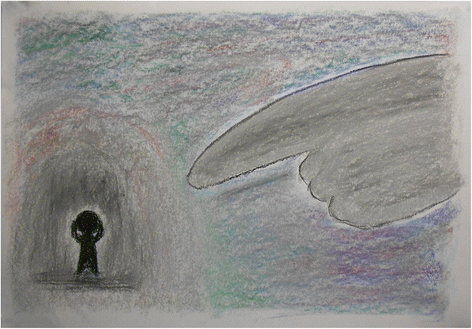Art-making in a family medicine clerkship: how does it affect medical student empathy?
- PMID: 25431323
- PMCID: PMC4256925
- DOI: 10.1186/s12909-014-0247-4
Art-making in a family medicine clerkship: how does it affect medical student empathy?
Abstract
Background: To provide patient-centred holistic care, doctors must possess good interpersonal and empathic skills. Medical schools traditionally adopt a skills-based approach to such training but creative engagement with the arts has also been effective. A novel arts-based approach may help medical students develop empathic understanding of patients and thus contribute to medical students' transformative process into compassionate doctors. This study aimed to evaluate the impact of an arts-making workshop on medical student empathy.
Methods: This was a mixed-method quantitative-qualitative study. In the 2011-12 academic year, all 161 third year medical students at the University of Hong Kong were randomly allocated into either an arts-making workshop or a problem-solving workshop during the Family Medicine clerkship according to a centrally-set timetable. Students in the arts-making workshop wrote a poem, created artwork and completed a reflective essay while students in the conventional workshop problem-solved clinical cases and wrote a case commentary. All students who agreed to participate in the study completed a measure of empathy for medical students, the Jefferson Scale of Empathy (JSE) (student version), at the start and end of the clerkship. Quantitative data analysis: Paired t-test and repeated measures ANOVA was used to compare the change within and between groups respectively. Qualitative data analysis: Two researchers independently chose representational narratives based on criteria adapted from art therapy. The final 20 works were agreed upon by consensus and thematically analysed using a grounded theory approach.
Results: The level of empathy declined in both groups over time, but with no statistically significant differences between groups. For JSE items relating to emotional influence on medical decision making, participants in the arts-making workshop changed more than those in the problem-solving workshop. From the qualitative data, students perceived benefits in arts-making, and gained understanding in relation to self, patients, pain and suffering, and the role of the doctor.
Conclusions: Though quantitative findings showed little difference in empathy between groups, arts-making workshop participants gained empathic understanding in four different thematic areas. This workshop also seemed to promote greater self-awareness which may help medical students recognize the potential for emotions to sway judgment. Future art workshops should focus on emotional awareness and regulation.
Figures
Similar articles
-
Art-mediated peer-to-peer learning of empathy.Clin Teach. 2014 Aug;11(5):327-31. doi: 10.1111/tct.12157. Clin Teach. 2014. PMID: 25041662
-
Palliative care and the arts: vehicles to introduce medical students to patient-centred decision-making and the art of caring.BMC Med Educ. 2017 Dec 16;17(1):257. doi: 10.1186/s12909-017-1098-6. BMC Med Educ. 2017. PMID: 29246258 Free PMC article.
-
An Empathy and Arts Curriculum During a Pediatrics Clerkship: Impact on Student Empathy and Behavior.MedEdPORTAL. 2024 Jul 12;20:11414. doi: 10.15766/mep_2374-8265.11414. eCollection 2024. MedEdPORTAL. 2024. PMID: 39006204 Free PMC article.
-
[Empathy-building of physicians. Part III. Students exposure to literature, theatre, film and the arts].Pol Merkur Lekarski. 2010 Nov;29(173):331-5. Pol Merkur Lekarski. 2010. PMID: 21268921 Review. Polish.
-
Educating for empathy. A review.J Gen Intern Med. 2006 May;21(5):524-30. doi: 10.1111/j.1525-1497.2006.00443.x. J Gen Intern Med. 2006. PMID: 16704404 Free PMC article. Review.
Cited by
-
A systematic scoping review of approaches to teaching and assessing empathy in medicine.BMC Med Educ. 2021 May 22;21(1):292. doi: 10.1186/s12909-021-02697-6. BMC Med Educ. 2021. PMID: 34020647 Free PMC article.
-
Applying narrative medicine to prepare empathetic healthcare providers in undergraduate pharmacy education in Singapore: a mixed methods study.BMC Med Educ. 2024 Mar 15;24(1):292. doi: 10.1186/s12909-024-05254-z. BMC Med Educ. 2024. PMID: 38491363 Free PMC article.
-
AnArtomy: Arts, Anatomy and Medicine - Human Beings Being Human.MedEdPublish (2016). 2018 Sep 10;7:204. doi: 10.15694/mep.2018.0000204.1. eCollection 2018. MedEdPublish (2016). 2018. PMID: 38074618 Free PMC article.
-
Curricula for empathy and compassion training in medical education: A systematic review.PLoS One. 2019 Aug 22;14(8):e0221412. doi: 10.1371/journal.pone.0221412. eCollection 2019. PLoS One. 2019. PMID: 31437225 Free PMC article.
-
Art Interventions to Mitigate Burnout in Health Care Professionals: A Systematic Review.Perm J. 2023 Jun 15;27(2):184-194. doi: 10.7812/TPP/23.018. Epub 2023 Jun 12. Perm J. 2023. PMID: 37303185 Free PMC article.
References
Publication types
MeSH terms
LinkOut - more resources
Full Text Sources
Other Literature Sources



